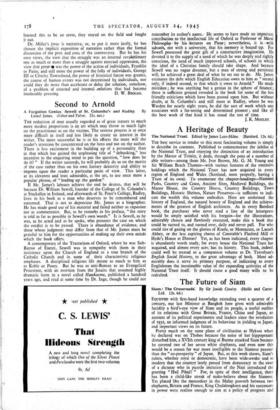Second to Arnold
A Forgotten Genius Sewell of St. Columba's and Hadley. By Lionel James. 4Faber and Faber. 21s. net.)
THE reduction of men usually regarded as of great stature to much more modest proportions is an art which may throw as much light on the practitioner as on the victims. The reverse process is at once more difficult in itself and less likely to create an interest in the writer. The more successful he is in his efforts the more will the reader's attention be concentrated on the hero and not on the author. There is less excitement in the building up of a personality than in that which has gained the unpleasing tide of " debunking," less incentive to the enquiring mind to put the question, " how does he do it? " If the writer succeeds, he will probably do so on the merits of the case rather than on his own literary dexterity and ability to impress upon the reader a particular point of view. This latter, at its cleverest and least admirable, is the art, to use once more a popular phrase, of " Leading up the garden."
If Mr. James's labours achieve the end he desires, that will be because Dr. William Sewell, founder of the College of St. Columba's at Stackallan in Ireland, and afterwards of St. Peter's College, Radley, lives in his book as a man who deserves to be remembered and esteemed. That is not to depreciate Mr. James as a biographer. He has made good use of his material and failed neither as expositor nor as commentator. But, as he remarks in his preface, " the story is told as far as possible in Sewell's own-words." It is Sewell, as he was, as he acted and as he spoke, who presents the case on which the verdict is to be passed. There is abundance of evidence, and those whose judgment may differ from that of Mr. James must be• grateful to him for the opportunities of making up their own minds which the book offers.
A contemporary of the Tractarians of Oxford, where he was Sub- Rector of Exeter, Sewell was in sympathy with them in their insistence upon the Church of England as a true branch of the Catholic Church and in some of their characteristic religious emphases. A disciplined religious life meant as much to him as to Keble or Pusey. But he was as anti-Roman as an Evangelical Protestant, with an aversion from the Jesuits that assumed highly dramatic form in a novel called Hawkstone, published a hundred years ago, and read at some time by Dr. Inge, though he could not
remember its author's name. He seems to have made an important contribution to the intellectual life of Oxford as Professor of Moral Philosophy- by his lectures on Plato; nevertheless, it is -with schools, not with a university, that his memory is bound up. For Sewell possessed the great gift of a constructive imagination. He devoted it to the supply of a need of which he was deeply and rightly conscious, the need of much improved schools, of schools in which the ideal of a Christian family should take shape. And because Sewell was no vague dreamer, but a man of strong and persistent will, he achieved a great deal of what he set out to do. Mr. James estimates the debt which English Education owes to him as " second only, if indeed second, to that which it owes to Arnold." He made mistakes ; he was anything but a genius in the sphere of fmance,; there is sufficient ground revealed in the book for some of the less friendly criticisms which have been passed upon him. But without doubt, at St. Columba's and still more at Radley, where he was Warden for nearly eight years, he did the sort of work which one associates with a far-seeing and determined pioneer ; and like all the best work of that kind it has stood the test of time.
J. K. MOZLEY.






















 Previous page
Previous page